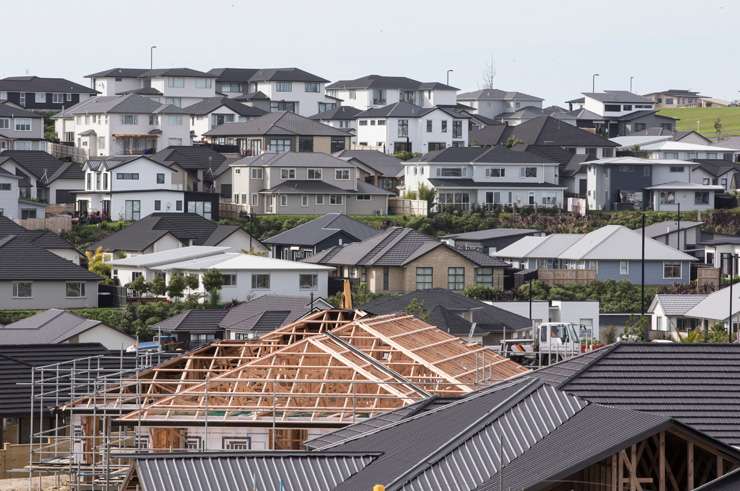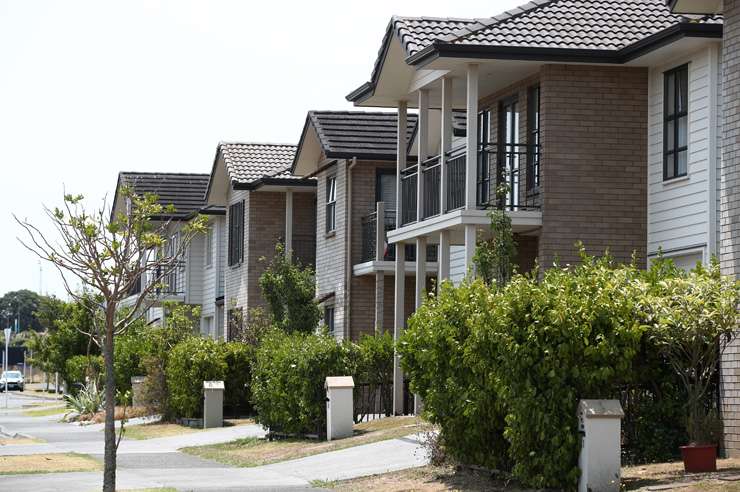Less than half of Auckland homes would sell above their CV if they were put on the market today, new research suggests.
Analysis of property values in Auckland by OneRoof and its data partner Valocity shows only 43.7% of properties are worth more than their new rating valuation.
Auckland homeowners were issued their new CVs in March this year when house prices were starting to fall - but the valuations were undertaken in June last year when the market was high.
Many commentators thought the runaway house prices would continue and soon render the CVs useless as a price guide but the market slump has since wiped out a lot of value gains in the city.
Start your property search
Valocity analysed property values in 277 suburbs in Auckland and identified 120 where more than 50% of homes were currently worth less than their new CV.
The majority of sub-CV suburbs were in the North Shore and in Auckland City, while Franklin, Papakura, Rodney and Waitakere had the fewest affected suburbs.
The suburbs with the highest percentage of homes worth less than their CV were Stonefields (94.4%), One Tree Hill (92.2%) and Greenlane (91.5%).
The analysis also tracked the number of sales in the city that came in below CV since the new valuations were issued at the start of March. Of the 7256 settled sales tracked, 2817 (39%) sold for less than CV.
Auckland Central recorded the most sub-CV sales (198), while Northcote and Ellerslie had the highest share of sub-CV sales of the suburbs with 20 or more settled sales.
Of the suburbs with 20 or more sales, Silverdale had the fewest sub-CV sales with just 2% of its 57 sales coming in below CV – but half of the sales in Auckland's prized Remuera were below CV, while more than a third of those in Herne Bay were in a similar position.
CVs are usually released every three years but Auckland’s were released late after lengthy Covid-related delays.
While experts and agents generally advise buyers and sellers to avoid using them in determining the real market value of their home, that’s a hard message to get through to CV-obsessed Aucklanders.
Wayne Shum, senior research analyst for Valocity, says rating values give councils a base by which to impose their rates but they are quickly out of date in a moving market.
Where Wellington is seeing a higher proportion of homes selling under their rateable values (nearly 100 per cent of homes would sell for less, according to the Valocity data) Auckland’s valuations were undertaken earlier than the capital’s, and in the Capital prices have plunged even lower in the housing downturn.
Auckland’s CVs were effective as of June last year but Auckland did not start its value decline until later and the decline is so far not as pronounced, Shum says.
If the market continues to trend down then Auckland may still see similar declines: “Now that we enter spring maybe it will stabilise, maybe it will continue to drop, we've yet to know.”
Shum says CVs don’t tend to become more relevant during any part of their three-year rating cycle.

Houses in Silverdale, on Auckland’s northern fringes. Most properties in the suburb are still selling for above CV. Photo / Greg Bowker
“It depends on what the market's doing in those three years. Sometimes it goes up then comes back down, sometimes it goes down then comes back up but sometimes it continues to go up so it doesn't really become more accurate.”
Steve Koerber, from Ray White Remuera, says CVs are the last place he goes when looking for answers as to what a property is worth but they are the first place Aucklanders go.
There are often inaccuracies in the data used by council, such as incorrect floor size, making some CVs “ridiculously wrong”.
And sometimes owners are lumbered with a high CV based on the amount of land, but that, too, can make a CV misleading.
“Generally speaking, if you've got 2000 square meters of flat land or shockingly steep land and they're right next to each other quite often the council will value them exactly the same.”
Yet Aucklanders still have an obsession with CVs, he says. He doesn’t understand why and points out in the current market having a high CV is detrimental because some people think they can’t afford a property they might be able to afford.
On a property marketed for sale by auction, negotiation or tender where no price is listed most people go first to the CV then pick up the phone to ring the agent.
But when the CV is very high and someone’s budget is lower, they might not even pick up the phone.
The flip side of that is properties with low CVs can sell for substantially higher prices, so having a low CV can be positive for a marketing campaign.

More than 94% of homes in Stonefields are worth less than their CV. Photo / Fiona Goodall
While Koerber puts no faith in CVs, he does say they can be a useful starting point for a conversation.
“Quite often that's when their opinion comes out and they'll say ‘but properties are selling below CV at the moment aren't they?’ And I go ‘yep, some are but not all are.’”
If it becomes apparent the potential buyer has no chance of being able to afford the property Koerber is able to direct them to a property they may be able to afford.
“CVs are a good reference point for many conversations but they are not a good reference point for the value of a property.”
On the North Shore, Bayswater and Belmont are suburbs with a large share of sub-CV sales.
Peter Vollebregt, from Premium Devonport, thinks that could be because in a matter of six or seven months prices shot up to “astronomical” levels but the market is now settling into more sustainable levels.
Those suburbs had been under-valued and the market went up too high and too fast: “Prices shot up there so quickly I think a bit beyond what was really reasonable.”
Now there is a readjustment taking place, hence some properties selling under CV.
“Maybe some people had to sell, some of them even had bought already, so, therefore, maybe you're seeing some of them selling for below CV, but some CVs are a bit on the high side.”
Vollebregt is not hearing people complaining, though, saying most vendors are accepting they might get less than the CV.

Harcourts Cooper & Co managing director Martin Cooper says CVs shouldn’t be used as a price guide. Photo / Ted Baghurst
“People ask me about it and I say ‘well, don't forget it's a rateable value and if you want to get a proper valuation you need to talk to a registered valuer.’”
Martin Cooper, managing director of the North Shore’s Harcourts Cooper & Co, is disparaging of CVs when it comes to real estate, saying they have no impact on the market value of a property.
Buyers and sellers who base decisions on them are somewhat naïve, he says.
“As an agency we treat the rateable value as just what it is, it’s just another way of determining how much tax you pay to the Auckland Council.”
Across in central Auckland suburbs, Simone Jonell, branch manager for Bayleys Ellerslie and One Tree Hill, says people’s attraction to CVs could be impacting the market in her patch, which includes Stonefields.
Realistic appraisals may not reach the CV and can be a factor in whether people bring a property to the market.
But Jonelle says because the CVs were carried out midway through last year when prices were high, with that market gone it’s no wonder some properties are selling for less.
“The CVs that I see look a lot more like last year's prices than this year's price.”
Her suburbs also lost a lot of volume through investors and first home buyers exiting the market – but now is a great time for them to buy, she says.
“It’s a fabulous time for first home buyers and investors - investors should be selling their old stock and buying a new build to get the tax [breaks], and the buyers that we do have are buying so well, they really are.
“They hold the reins in the negotiation and get what they want without the competition.”














































































